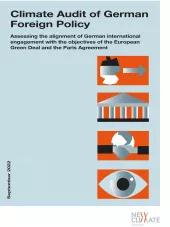Please note that this policy brief was originally published in German. You can find the English translation here.
Germany's foreign economic interests are increasingly caught in the crossfire of global crises, geopolitical power shifts, and the worldwide transition toward climate-neutral economic systems. In this context, a forward-looking international climate policy can not only help address global challenges but also unlock economic opportunities and strengthen strategic alliances.
This policy briefing identifies five priorities derived from the foreign trade objectives enshrined in the coalition agreement and shows how they can be supported through a strategic and ambitious international climate policy:
- Establish and deepen strategic partnerships: Climate policy cooperation enhances the relevance and appeal of German offerings to countries in the Global South. Transformation partnerships that promote the development of climate-friendly industries, technology transfer, and social resilience foster long-term connections and strengthen Germany’s geopolitical position in the competition for partnerships and future markets.
- Strengthen multilateralism and expand global leadership: Germany should anchor the transition to climate neutrality as a stabilizing factor within the multilateral system. Dialogues with Global South countries aligned with their development and decarbonization priorities, proactive engagement in multilateral forums, and fair climate financing build trust, deepen cooperation, and reinforce multilateralism in geopolitically turbulent times.
- Reduce dependencies and secure supply chains: The restructuring of global supply chains offers opportunities for fair, transparent, and sustainable partnerships, for example in the raw materials or hydrogen sectors. Climate foreign policy can help reduce critical dependencies while promoting local development in partner countries. Sustainable trade rules and common standards enhance international resilience.
- Promote Germany as an economic and export hub: Green lead markets are emerging worldwide, and German companies benefit from clear and reliable foreign and climate policy. International cooperation enables market access, secures investments, and supports the export capability of green technologies. Climate policy thus also serves as a growth driver for Germany’s economic base.
- Integrate climate into German security policy: Climate change intensifies conflicts and particularly undermines fragile states. International climate policy can help address the root causes of conflict and boost resilience. It complements traditional foreign and security policy tools and is a key element of a comprehensive understanding of security.
Please note that this policy brief was originally published in German. You can find the English translation here.









